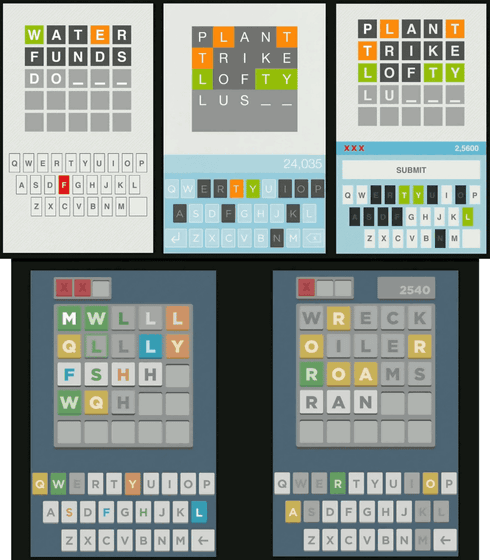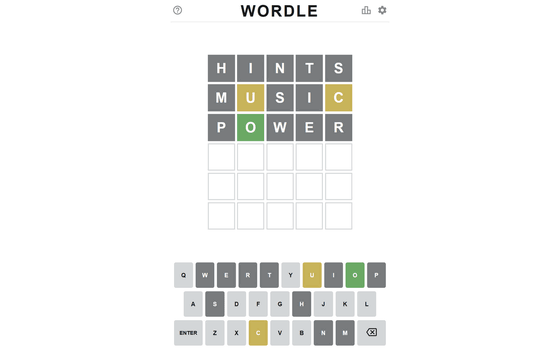The creator of the popular word guessing game 'Wordle' talks about the early stages of its creation and how it was sold to the New York Times

' Wordle ', a game where you guess hidden words while typing letters, became extremely popular as soon as it was released, and
Wordle's original name was Mr. Bugs' Wordy Nugz - The Verge
https://www.theverge.com/24186786/wordle-original-name-mr-bugs-wordy-nugz-wardle

Browser-based design tool Figma held a conference called Config 2024 on June 26-27, 2024 local time to explain updates, new products, Figma AI , and more. At Config 2024, Josh Wardle, the developer and namesake of Wordle, appeared as a guest and explained some of the important decisions he made during the development of Wordle.
Figma Config 2024 | June 26-27 - Moscone Center SF
https://config.figma.com/

At Config 2024, Wardle showed off some prototypes from when he first started making Wordle. According to Wardle, the basic rule of 'guessing a five-letter word in six tries' was already decided in the early version created for Android. This is because, as Wardle revealed in a past interview with the New York Times, 'I made Wordle as a gift for my partner, who liked word games and also liked the board game Mastermind, which involves guessing based on the color of the pins,' and the rules and concepts of the game follow Mastermind.
Since Wordle updates questions and answers every day, it is no longer possible to challenge multiple questions per day, but in the early version, when you clear one question, a new question appears, allowing you to challenge it endlessly. In addition, since five-letter words are randomly presented, even people who are good at English may be presented with words they do not know.
So Wardle created a different game where participants were shown a list of words and had to answer 'I know the word,' 'I don't know the word,' or 'I might know it, but I'm not sure.' Wardle's partner responded to this, and the list of 10,300 five-letter words was narrowed down to 2,500.
The image below shows some of the old game designs that Wardle showed during the presentation. You can see that various looks and game systems were considered, such as the color of the hints changed and the 'X mark' that shows the number of times you can no longer clear.

These game designs were done in 2013, and one of the early ideas for the name of the game was 'Mr. Bugs' Wordy Nugz.' Wardle said, 'If I had named this game Mr. Bugs, I don't think it would have been successful.' However, even though the game was almost complete, it was stopped at the idea stage, and development was postponed for six years.
Later, around 2020, Wardle had more time due to the COVID-19 pandemic and resumed development of Wordle by digging up ideas. At the time, Wardle often played the New York Times
As a result, Wardle released Wordle on his personal website in 2021. As for the reason for releasing it on a website instead of a game that can be downloaded as an app, he said, 'The general opinion on games is that you need an app to get a fanbase. But I didn't want to do that. My partner and I were the only ones who played the game, and it was only natural for me to create a website. As a result, I think it was a good idea to release it on a website so that it could be played widely. You can play it immediately by just sharing the link.' The image below is Wordle before it was acquired by The New York Times, and the design is almost the same as it is today.

For the first six months, Wordle was played by just Wardle and his partner. After that, it was shared with family and friends, and the number of users increased rapidly as a result of adding a feature to share the results on Twitter. Finally, on January 31, 2022, Wordle was acquired by the New York Times for a 'low seven figures' in US dollars, or several hundred million yen in Japanese yen. Wardle said, 'I think the news of the acquisition surprised a lot of people. For me, selling the game was a very clear decision. I was interested in making something, and I didn't want to run a game business. Wordle was a very successful game, and I could have run a great operation from it if I wanted, but there were a lot of things about running a game business that I didn't enjoy, and it was clear that it was something I didn't want to be involved in.' He talked about the reason for the sale.
Wardle also said that he didn't want to monetize the game he made for his partners. Wardle didn't want to make money from Wordle, but as Wordle's popularity grew, copycat apps appeared on the App Store, making it difficult for him to continue releasing it as a free game on his own. So, 'selling Wordle to the New York Times was just a way to distance myself,' Wardle said.
Copycat apps of the popular word guessing game 'Wordle' disappeared immediately after it was reported that Apple's App Store was overflowing with them - GIGAZINE

Finally, Wardle's advice to anyone who wants to make a game that goes viral is, 'I don't think I would have made Wordle if I had the intention of making it viral. Wordle was just something I was passionate about for my partner, and it just happened to appeal to a lot of other people. If you're trying to make something, don't try to make Wordle. Make something that you're passionate about, that means something to you, and everything else will come from there.'
Related Posts:
in Web Service, Game, Posted by log1e_dh






